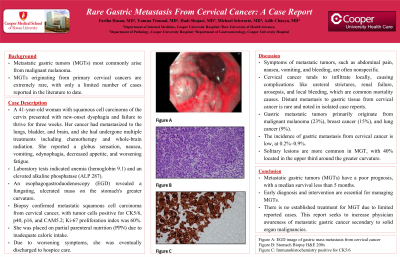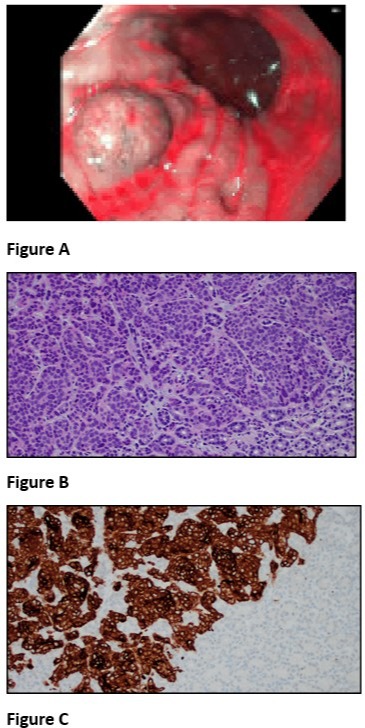Sunday Poster Session
Category: Stomach
P1662 - Rare Gastric Metastasis From Cervical Cancer: A Case Report
Sunday, October 27, 2024
3:30 PM - 7:00 PM ET
Location: Exhibit Hall E

Has Audio

Fariha Hasan, MD
Cooper University Hospital
Philadelphia, PA
Presenting Author(s)
Award: Presidential Poster Award
Fariha Hasan, MD1, Yumna Timsaal, MBBS2, Michael Schwartz, MD3, Hadi Shojaei, MD3, Adib Chaaya, MD4
1Cooper University Hospital, Philadelphia, PA; 2Dow Medical College, Karachi, Sindh, Pakistan; 3Cooper University Hospital, Camden, NJ; 4Cooper Health Gastroenterology, Camden, NJ
Introduction: Cervical cancer is renowned for its propensity for local spread, and metastasis to the stomach from cervical cancer is considered to be a rare occurrence, with an estimated incidence ranging from 0.2% to 0.9%. Stomach metastasis is predominantly attributed to melanoma, breast, esophageal, or lung malignancies. Distant metastasis from cervical cancer to the gastric tissue is infrequently documented and is mostly observed in isolated case reports. We present a case of a 41-year-old female with cervical cancer who developed a metastatic gastric tumor (MGT) secondary to cervical cancer, presenting with new-onset dysphagia.
Case Description/Methods: A 41-year-old female with a history of cervical squamous cell carcinoma presented with new-onset dysphagia and failure to thrive. She had metastases to the lungs, bladder, and brain, for which she had undergone chemotherapy and radiation. Due to complaints of dysphagia, an esophagogastroduodenoscopy (EGD) was performed, which revealed a stomach mass present on the greater curvature of the stomach consistent with metastatic squamous cell carcinoma from her cervical cancer. Biopsy results from the EGD showed findings consistent with a malignant squamous cell carcinoma on the greater curvature of the stomach from her known primary cervical cancer. The tumor cells were positive for CK5/6, p40, p16, and CAM5.2 confirming metastasis. The ki-67 proliferation index of the tumor cells was 60%, indicating a high tumor burden. Despite treatment, she necessitated partial parenteral nutrition and was eventually discharged to hospice care due to worsening symptoms.
Discussion: Most gastric tumors are primary neoplasms and secondary gastric metastasis from cervical cancer is rarely encountered. The pathogenesis of metastatic gastric tumors varies depending on the primary cancer, with hematogenous spread being a common mode. Clinical presentation mimics that of primary gastric malignancies and encompasses symptoms such as dysphagia, anorexia, abdominal pain, nausea, vomiting, and upper GI bleeding. A solitary lesion is more commonly observed in the presentation of MGT than multiple lesions. Of the solitary lesions in the stomach, 40% are situated in the upper third around the greater curvature and 40% in the middle third, while lesions in the antrum are less common. The prognosis for patients with MGT is poor, with a median survival of 4.75 months, underscoring the critical importance of early diagnosis and intervention for effective management.

Disclosures:
Fariha Hasan, MD1, Yumna Timsaal, MBBS2, Michael Schwartz, MD3, Hadi Shojaei, MD3, Adib Chaaya, MD4. P1662 - Rare Gastric Metastasis From Cervical Cancer: A Case Report, ACG 2024 Annual Scientific Meeting Abstracts. Philadelphia, PA: American College of Gastroenterology.
Fariha Hasan, MD1, Yumna Timsaal, MBBS2, Michael Schwartz, MD3, Hadi Shojaei, MD3, Adib Chaaya, MD4
1Cooper University Hospital, Philadelphia, PA; 2Dow Medical College, Karachi, Sindh, Pakistan; 3Cooper University Hospital, Camden, NJ; 4Cooper Health Gastroenterology, Camden, NJ
Introduction: Cervical cancer is renowned for its propensity for local spread, and metastasis to the stomach from cervical cancer is considered to be a rare occurrence, with an estimated incidence ranging from 0.2% to 0.9%. Stomach metastasis is predominantly attributed to melanoma, breast, esophageal, or lung malignancies. Distant metastasis from cervical cancer to the gastric tissue is infrequently documented and is mostly observed in isolated case reports. We present a case of a 41-year-old female with cervical cancer who developed a metastatic gastric tumor (MGT) secondary to cervical cancer, presenting with new-onset dysphagia.
Case Description/Methods: A 41-year-old female with a history of cervical squamous cell carcinoma presented with new-onset dysphagia and failure to thrive. She had metastases to the lungs, bladder, and brain, for which she had undergone chemotherapy and radiation. Due to complaints of dysphagia, an esophagogastroduodenoscopy (EGD) was performed, which revealed a stomach mass present on the greater curvature of the stomach consistent with metastatic squamous cell carcinoma from her cervical cancer. Biopsy results from the EGD showed findings consistent with a malignant squamous cell carcinoma on the greater curvature of the stomach from her known primary cervical cancer. The tumor cells were positive for CK5/6, p40, p16, and CAM5.2 confirming metastasis. The ki-67 proliferation index of the tumor cells was 60%, indicating a high tumor burden. Despite treatment, she necessitated partial parenteral nutrition and was eventually discharged to hospice care due to worsening symptoms.
Discussion: Most gastric tumors are primary neoplasms and secondary gastric metastasis from cervical cancer is rarely encountered. The pathogenesis of metastatic gastric tumors varies depending on the primary cancer, with hematogenous spread being a common mode. Clinical presentation mimics that of primary gastric malignancies and encompasses symptoms such as dysphagia, anorexia, abdominal pain, nausea, vomiting, and upper GI bleeding. A solitary lesion is more commonly observed in the presentation of MGT than multiple lesions. Of the solitary lesions in the stomach, 40% are situated in the upper third around the greater curvature and 40% in the middle third, while lesions in the antrum are less common. The prognosis for patients with MGT is poor, with a median survival of 4.75 months, underscoring the critical importance of early diagnosis and intervention for effective management.

Figure: Figure A-EGD image of gastric mass metastasis from cervical cancer
Figure B-Stomach Biopsy H&E 200x
Figure C-Immunohistochemistry positive for CK5/6
Figure B-Stomach Biopsy H&E 200x
Figure C-Immunohistochemistry positive for CK5/6
Disclosures:
Fariha Hasan indicated no relevant financial relationships.
Yumna Timsaal indicated no relevant financial relationships.
Michael Schwartz indicated no relevant financial relationships.
Hadi Shojaei indicated no relevant financial relationships.
Adib Chaaya indicated no relevant financial relationships.
Fariha Hasan, MD1, Yumna Timsaal, MBBS2, Michael Schwartz, MD3, Hadi Shojaei, MD3, Adib Chaaya, MD4. P1662 - Rare Gastric Metastasis From Cervical Cancer: A Case Report, ACG 2024 Annual Scientific Meeting Abstracts. Philadelphia, PA: American College of Gastroenterology.


